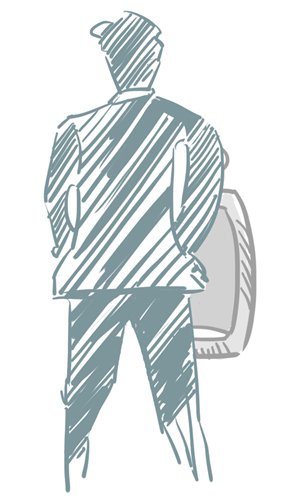- Home > News > Domestic News
- domestic news
Gross office toilets in Shanghai betray well-dressed workers

Illustration: Chen Xia/GT
When I first started my new job in Shanghai, I was quite happy to be working amongst so many motivated young Chinese businessmen. I enjoyed the teamwork, their effort to speak English and their attempt to learn more about Western culture.
The company being rather big, our headquarters are located in a fancy skyscraper in downtown Shanghai. On the 18th floor there are about 100 employees. During my first tour of the office space, I was shown the kitchenette where some of my new colleagues were heating up leftovers for lunch or boiling water in kettles.
Right next to the kitchen is the men's bathroom. I was immediately enchanted by the futuristic toilet, a feat of modern technology; it even had a remote control! Not even in my home country, France, had I ever seen such a contraption. Unfortunately, I quickly learned that, in China, old habits die hard when it comes to using the latrine.
The first thing I noticed was that, here, bathrooms are not just for relieving one's bowels and bladder. No, the WC is also a place where men can go smoke a cigarette, talk or play on their phones and even chat with each other.
For some reason, Chinese men do not lock the doors when using the toilet; it's like an open invitation to come have a meeting. I've had more than a few embarrassing moments (for me) upon walking in on my colleagues doing their other business.
This is when I also have witnessed them making professional calls while sitting on the can, smoking a cigarette or three (old congee cans are used as ashtrays). It doesn't seem to matter to them that our building is covered with no-smoking signs, part of Shanghai's new crackdown on public smoking, including at the workplace. As a result, walking into our restroom is like a gas chamber, my nice suits absorbing the noxious smoke.
Ironically, despite the professional appearance of my Chinese colleagues, once they enter the bathroom, their inner-peasant is unleashed. Despite our high-powered sewer system, they still use trash cans for their dirty toilet paper, which looks and smells disgusting. Our whole office building is spotless, thanks primarily to the ayi cleaning crew - everywhere except our toilet, which by 10 am is a disaster zone of bodily fluids.
To make my point, you must excuse me for going into detail. You see, half of our bathroom space is dedicated to urinals, which any child could use, as they are designed to catch every last drop. But no, the college-educated adult men I work with just can't seem to aim into the designated space in front of them. The result is a piss-covered floor that requires uptight people like me to contort my body in order to avoid slipping in the nasty yellow puddles.
Again I must emphasize that our office is cleaned twice a day by hard-working ayi, but still our bathroom floor remains covered in pee from morning till night. I really pity the women who must constantly mop up their mess. But then again, I heard from some of my female colleagues that the hygiene of the women's toilet is just as crappy (quite literally). They complained that many office women spray pee all over the seats and leave used bloody pads on the floors. I'm very glad I don't have to see that.
I respect that many of my colleagues come from the countryside, where toilets were often communal and rudimentary, and thus don't have the same high standards that city folk do when it comes to sanitation and sewage. But I still can't understand why so many well-educated Chinese adults continue to use public toilets as their own private offices.
I was raised with the strong rule to never do anything in a public place that you wouldn't do at home, so I can only imagine what these guys' home bathrooms look and smell like. In the meantime, I am at least grateful that so many public toilets in Shanghai now have little signs in front of the urinals saying "a small step forward for men is a big step for Chinese civilization."
The opinions expressed in this article are the author's own and do not necessarily reflect the views of the Global Times.
| Chinese Association on Tobacco Control Copyright © 1992-2011 906-907 Anhuidongli, Chaoyang District Beijing 100101 |